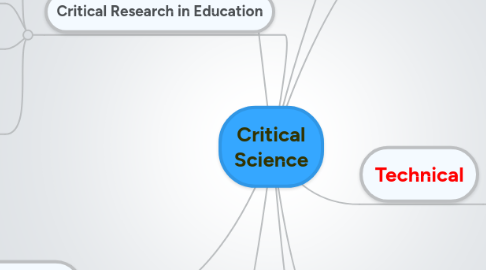
1. Necessary Conditions for Critical Research
1.1. 1. equal opportunity to participate
1.2. 2. variety of descriptions of situation
1.3. 3. all interests represented and consequences of actions considered
1.4. 4. attention to reasons for decisions
1.5. 5. identify contradictions between beliefs and practice
1.6. 6. history helps understand the present and formulate the future
1.7. 7. requires knowledge about constraints on participants and identifies incomplete knowledge
2. Two kinds of Critical Methodology
2.1. Ideology Critique
2.1.1. unjust dominant ideologies are found in everyday life
2.2. Action Research
2.2.1. participants have input into the inquiry process
2.3. Qualitative
2.3.1. observation and interviews
2.4. Dialogic
2.4.1. conversation and reflection
3. Emancipative
3.1. Critical
3.1.1. Know WHY
3.1.2. gained through self-reflection
3.2. growth and advancement
3.2.1. participate in constructing your social world
3.2.2. the power to control your own life
3.2.2.1. free us from technical control
3.3. exposing constraints and domination
3.3.1. expose false consciousness
3.3.2. investigating cultural hegemony
3.3.3. Critical Education Theory
3.3.3.1. What can research do to change existing educational and social inequalities
3.3.3.1.1. create curricula and pedagogy that are more socially just
3.3.3.2. Who is shaping the education that shapes the public mind?
3.3.3.3. Repositioning
3.3.3.3.1. act against the ideologies and institutional processes that oppress
4. Critical Research in Education
4.1. Researcher is both observer and participant
4.1.1. Researcher and participants identify a practical problem
4.1.2. empirical and interpretive knowledge to understand the problem
4.1.3. Empathy
4.2. Goals, assumptions and `givens`are examined
4.3. Barriers, inconsistencies and distortions are uncovered
4.4. The goal is to help people make their own destiny--autonomy and freedom.
4.4.1. Enlightenment
4.4.1.1. seeing distortions in thinking, acting and communicating
4.4.2. Empowerment
4.4.2.1. using critical thinking to transform repressive situations
4.4.3. Emancipation
4.4.3.1. achieving social freedom
5. Technical
5.1. Empirical
5.1.1. Know HOW
5.1.1.1. Instrumental orientation
5.2. domination of technical action degrades human life
5.2.1. unexamined goals lead to technical rules
5.2.2. often reflect industrial or business interef
5.3. must be balanced with practical action
5.4. control of physical environment
5.4.1. physical and social necessities of life
5.4.2. goal of civilized living
6. Practical
6.1. Interpretive
6.1.1. Know WITH
6.1.2. Symbolic interaction: language and social norms and values
6.2. Builds communicative competence
6.3. understanding the meaning of situation
6.3.1. hermeneutic
6.3.2. historical
6.4. Links the areas of knowledge used in forming judgements
6.4.1. results in action
7. Knowledge balances Technical and Practical
7.1. understand the messages between yourself and others
7.2. Critical Discourse Analysis
7.2.1. Words are never neutral
7.2.2. discourse of the dominant interprets in favor of the dominant class
7.2.3. discourse of the marginalized is seen as a threat to the dominant
7.2.4. The role of the home economist is to to hear and legitimize the voice of the marginalized and to question the voice of those in power
